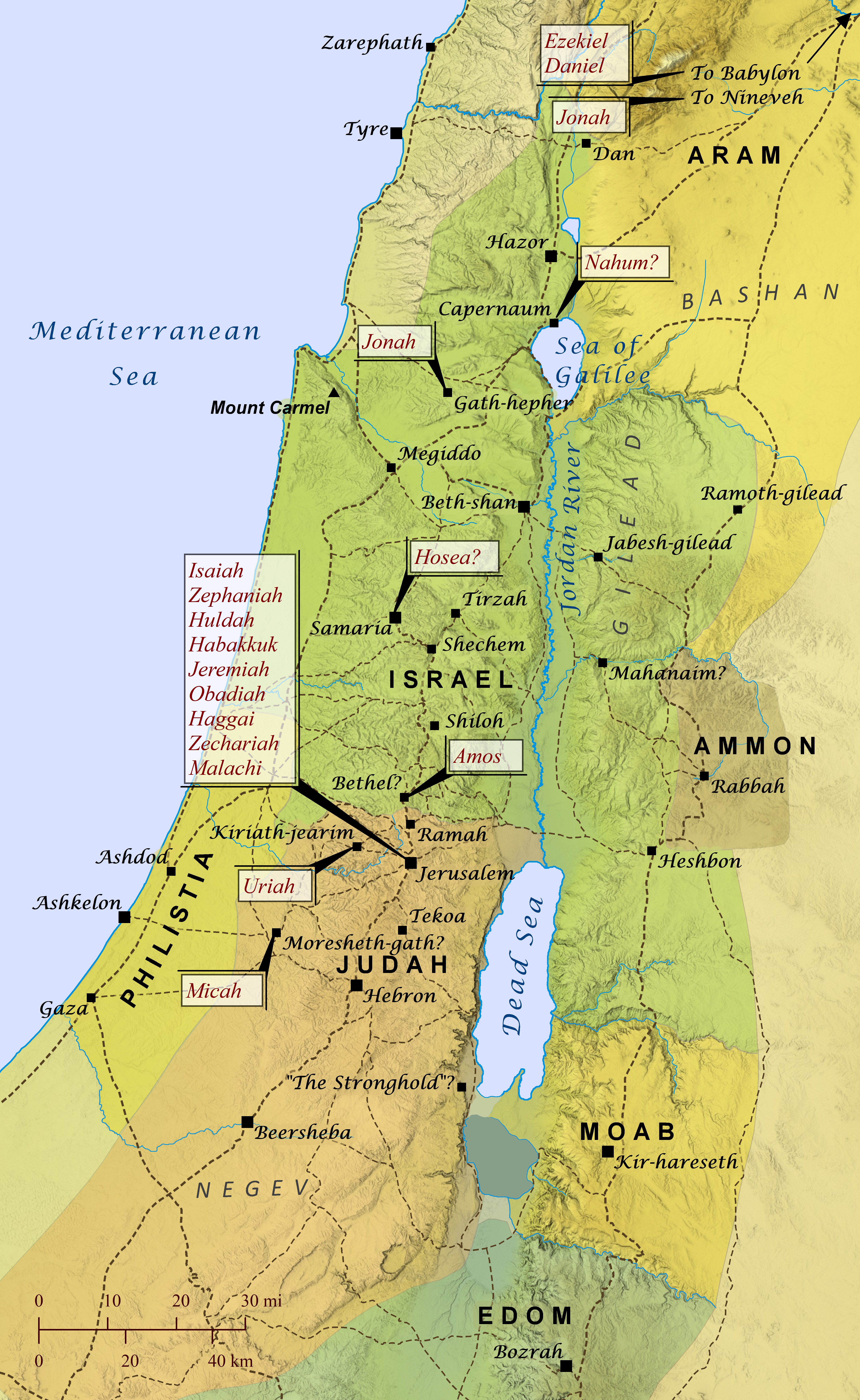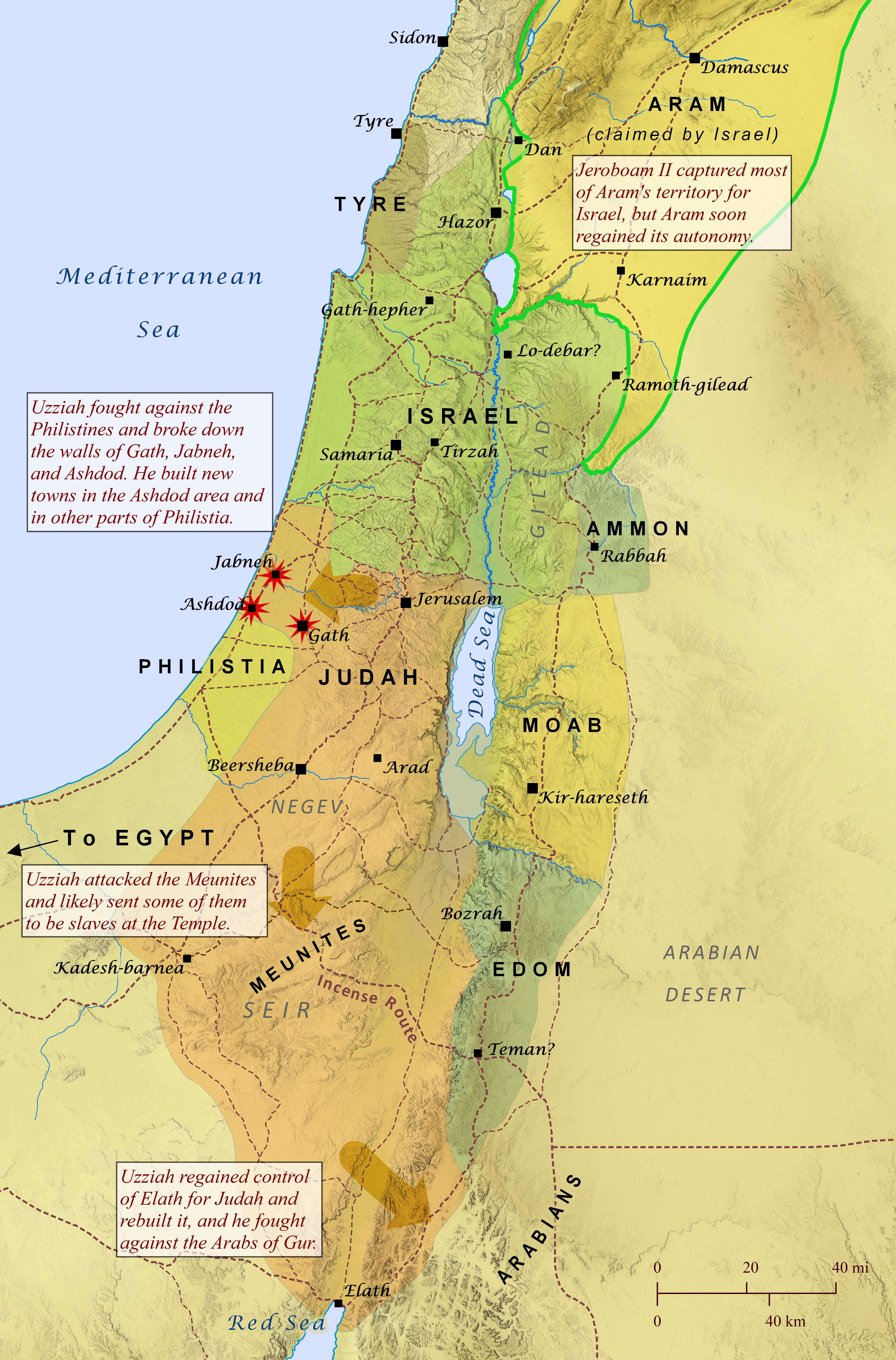Readers’ Version
Literal Version
26 Then all the people took sixteen year old Uzziyah and made him king to replace his father Amatsyah. 2 Uzziyah restored Eylat City to Yehudah and rebuilt it after the death of his father.
3 Uzziyah was sixteen when he became king, and he reigned from Yerushalem for fifty-two years. His mother was Yekolyah from Yerushalem. 4 He did the things that Yahweh said were good, like his father Amatsyah had done. 5 He strived to follow God during the lifetime of Zekaryah who instructed him. During the time that he obeyed Yahweh, God made him successful.
6 Uzziyah went to attack the Philistines, and successfully broke through the walls at Gat, Yavneh, and Ashdod. He rebuilt Ashdod and other cities in the Philistia region. 7 God helped him against the Philistines, against the Arabians who living in Gurbaal, and against the Meunites. 8 The Ammonites paid tribute to Uzziyah, and his fame spread as far as the Egyptian border because he was becoming more powerful.
9 King Uzziyah built fortified towers in Yerushalem at the Corner Gate, the Valley Gate, and at the angle in the wall. 10 He also built towers in the wilderness and dug many wells because he had a lot of cattle—both in the lowlands and in the plains. He was also interested in horticulture so he had workers stationed in his vineyards and in his fertile fields.
11 Uzziyah’s army was trained for fighting battles and organised into divisions set up by Yeiel the scribe and the commander Maaseyah, under the supervision of Hananyah, one of the king’s officials. 12 There were 2,600 clan leaders who led the powerful warriors, 13 and the full force of 37,500 was under them to support the king against his enemies. 14 Uzziyah supplied shields, spears, helmets, armoured vests, bows, and slingshots for the entire army. 15 Using a local invention, he made war machines in Yerushalem to be placed on the towers and corners of the walls to fire arrows and large stones. His fame now spread widely because he’d received a lot of help that had made him very powerful.
16 However, at the peak of his strength he became very arrogant and that led to his destruction. He disobeyed his god Yahweh and went into the temple to burn incense on the incense altar. 17 The high priest Azaryah and eighty other brave priests went in after him. 18 They confronted King Uzziyah and challenged him, “It’s not permitted for you, Uzziyah, to sacrifice to Yahweh, only for Aharon’s descendants the priests—the ones consecrated to sacrifice. Leave the sanctuary, because you’ve disobeyed Yahweh God so now he won’t honour you.”[ref]
19 Then Uzziyah who was holding an incense pan, became very angry, but when he started raging at the priests, spots of leprosy suddenly appeared on his forehead while he was still there beside the incense altar in front of the priests. 20 The high priest Azaryah looked more closely, and confirming that it was indeed leprosy on his forehead, hurried him outside. The king was now also in a hurry because Yahweh had afflicted him.
21 King Uzziyah had leprosy until he died, so he had to live in an isolated residence and wasn’t allowed to approach the temple. His son Yotam (Jotham) stood in for him—supervising the palace and ruling Yehudah.
22 The record of all the other things done by Uzziyah while he was king was written by the prophet Yeshayah (Isaiah) (son of Amots). 23 When Uzziyah died, because of his leprosy they buried him with his ancestors in a grave in the countryside for kings, and his son Yotam replaced him as king.[ref]
2 He he_built DOM ʼĒylōt and_restored_it to_Yəhūdāh after lay_down the_king with fathers_of_his.
3 was_a_son_of six- teen year[s] ˊUzziyyāh in/on/at/with_became_king_he and_fifty and_two year[s] he_reigned in/on/at/with_Yərūshālam/(Jerusalem) and_name_of his/its_mother was_Yəkāləyāh/(Jecholiah)[fn] from Yərūshālam/(Jerusalem).
4 And_he/it_made the_right in/on_both_eyes_of YHWH according_to_all that he_had_done ʼAmaʦyāh his/its_father.
5 And_he/it_was to_seek god in/on/at/with_days_of Zəkaryāh the_instructed in/on/at/with_fear the_ʼElohīm and_in/on/at/with_time_of sought_he DOM YHWH gave_success_him the_ʼElohīm.
6 and_he/it_went_out and_war in/on/at/with_Fəlishtiy and_broke_down DOM the_wall_of Gath and_DOM the_wall_of Yaⱱneh/(Jabneh) and_DOM the_wall_of ʼAshdōd and_built cities in/on/at/with_ʼAshdōd and_in/on/at/with_Fəlishtiy.
7 And_helped_him the_ʼElohīm on the_Fəlishtiy and_against the_ˊArāⱱī[fn] the_lived in/on/at/with_Gūr baˊal and_the_Məˊūnāy.
8 And_paid the_ˊAmmōnī tribute to_ˊUzziyyāh his/its_name and_he/it_went to mmm[fn] of_Miʦrayim/(Egypt) if/because he_displayed_strength to to_upward.
9 And_ ˊUzziyyāh _he/it_built towers in/on/at/with_Yərūshālam/(Jerusalem) at the_gate_of the_corner and_at the_gate_of the_valley and_at the_angle and_fortified_them.
10 And_he/it_built towers in/on/at/with_wilderness and_dug wells many if/because livestock much it_belonged to_him/it and_in/on/at/with_shəfēlāh and_in/on/at/with_plain farmers and_vinedressers in/on/at/with_hills and_in/on/at/with_fertile_lands if/because loving the_ground he_was.
11 and_he/it_was to_ˊUzziyyāh an_army maker[s]_of war those_who_go_forth_of army by_divisions in/on/at/with_numbers_of muster_of_their in/on/at/with_hand_of Yəˊīʼēl/(Jeiel)[fn] the_secretary and_Maˊₐsēyāh the_officer on the_hand_of Ḩₐnanyāh of_commanders_of the_king’s.
12 All_of the_number_of the_heads_of the_family of_warriors_of strength two_thousand and_six hundred(s).
13 And_under command_of_their an_army_of war three hundred(s) thousand and_seven_of thousand(s) and_five hundred(s) makers_of war in/on/at/with_power_of strength to_help to/for_the_king on the_enemy.
14 And_provided to/for_them ˊUzziyyāh to/from_all/each/any/every the_army shields and_spears and_helmets and_coats_of_mail and_bows and_for_stones_of slings.
15 And_he/it_made in/on/at/with_Yərūshālam/(Jerusalem) war_engines the_invention_of an_inventor to_be on the_towers and_on the_corners to_shoot in/on/at/with_arrows and_in/on/at/with_stones large his/its_name and_he/it_went_out to to_at_distance if/because he_made_wonderful to_helped until if/because he_was_strong.
16 And_when_strong_of_he his/its_heart it_was_haughty until to_destruction and_unfaithful in/on/at/with_LORD his/its_god and_entered into the_temple_of YHWH to_burn_incense on the_altar_of the_incense.
17 And_went_in after_him ˊAzaryāh the_priest/officer and_with_him priests to/for_YHWH eighty sons_of strength.
18 And_took_stand on ˊUzziyyāh the_king and_they_said to_him/it not to/for_yourself(m) Oh_ˊUzziyyāh to_burn_incense to/for_YHWH if/because for_the_priests the_descendants_of ʼAhₐron the_consecrated to_burn_incense go_out from the_sanctuary if/because you_have_acted_unfaithfully and_not to/for_yourself(m) for_honour from_LORD god.
19 And_ ˊUzziyyāh _angry and_in/on/at/with_hand_of_his a_censer to_burn_incense and_in/on/at/with_became_angry_he with the_priests and_the_leprosy it_arose in/on/at/with_forehead_of_his to_(the)_face_of/in_front_of/before the_priests in_house_of YHWH from_under to_altar_of the_incense.
20 And_looked to_him/it ˊAzaryāh the_priest_of the_chief and_all the_priests and_see/lo/see he was_one_who_had_a_skin_disease in/on/at/with_forehead_of_his and_hurried_him from_there and_also he he_hurried_himself to_get_out if/because afflicted_him YHWH.
21 And_he/it_was ˊUzziyyāh the_king having_a_skin_disease until the_day_of death_of_his and_he/it_sat_down//remained//lived the_house_of the_separate[fn] having_a_skin_disease if/because he_was_cut_off from_house_of YHWH and_Yōtām/(Jotham) his/its_son was_over the_house_of the_king he_was_judging DOM the_people_of the_earth/land.
22 And_rest_of the_matters_of ˊUzziyyāh the_first and_the_last[fn] Yəshaˊyāh/(Isaiah) he_has_written the_son_of ʼĀmōʦ the_prophet.
23 And_ ˊUzziyyāh _slept with fathers_of_his and_buried DOM_him/it with fathers_of_his in/on/at/with_field_of the_burial which belonged_to_the_kings if/because they_said was_one_who_had_a_skin_disease he and_ Yōtām _became_king his/its_son in_place_his.
26:3 OSHB variant note: יכיליה: (x-qere) ’יְכָלְיָ֖ה’: lemma_3203 n_0.0 morph_HNp id_14cKK יְכָלְיָ֖ה
26:7 OSHB variant note: ה/ערביים: (x-qere) ’הָֽ/עַרְבִ֛ים’: lemma_d/6163 b n_0.0.0 morph_HTd/Ngmpa id_14dbh הָֽ/עַרְבִ֛ים
26:8 OSHB exegesis note: WLC has this word divided as לְב֣וֹא
26:11 OSHB variant note: יעואל: (x-qere) ’יְעִיאֵ֣ל’: lemma_3273 morph_HNp id_14fYJ יְעִיאֵ֣ל
26:21 OSHB variant note: ה/חפשות: (x-qere) ’הַֽ/חָפְשִׁית֙’: lemma_d/2669 n_1.1.0 morph_HTd/Ncfsa id_14DcB הַֽ/חָפְשִׁית֙
26:22 OSHB note: BHS has been faithful to the Leningrad Codex where there might be a question of the validity of the form and we keep the same form as BHS.


